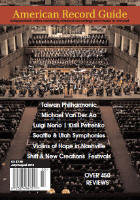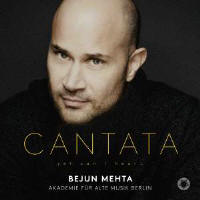Texte paru dans: / Appeared in: |
|
|
Outil de traduction ~ (Très approximatif) |
|
|
Reviewer: John
W. Barker
The theme of the program is the idiom of the Baroque “cantata” in the broadest sense. The word means generically no more than a sung piece. But in the 18th Century the term came to cover brief emotional vignettes, as against the much longer form of opera. In this program, Mehta urges application of the word to individual vocal pieces, including arias from large works, as reflecting wide-ranging expressive-ness and what he calls “humanist spirituality”. The largest items here are multi-movement works by three major composers, and are familiar from many other recordings. Thus we have Vivaldi’s Pianti, sospiri e dimandar mercede (R 676), and Handel’s Mi palpita il cor, the latter written originally for countertenor. Perhaps best known is Bach’s Cantata 82, Ich habe genug, originally written for bass but also adapted by the composer for soprano. Beyond these, we have two German pieces consisting of only one movement. One of these is the earliest work in the program, the despairing Lamento, ‘Ach, das ich Wassers g’nug haette’, by Johann Christoph Bach (1642-1703). The other is a lone aria, the Trauermusik, ‘Schlage doch, Gewunschte Stunde’, known as Bach’s Cantata 53, but now assigned tentatively to Melchior Hoffmann (c1679-1715). This “Funeral Song” includes a part for a single-note chime stroke, repeated many times. That is a really lovely and moving effect, but here it is transformed into a high tinkle at some distance and almost inaudible. Then there are three more Handel items, two of them real oddments that the composer shifted around between different scores: the Italian secular aria ‘Siete rose rugiadose’ and the English sacred air, ‘I will magnify thee’. I don’t recall ever encountering these on records. And finally there is the recitative, ‘Oh cease, enchanting Siren!’, and aria, ‘Yet can I hear that dulcet lay’, from Handel’s very late “Musical Interlude”, The Choice of Hercules. As sung by the title hero, it was written for either soprano or castrato (Guadagni), and the aria’s incipit is used as the subtitle for this album.
Mehta is in characteristically lovely voice here, notable for his frequent use of a very caressing tone—which may sometimes seem a bit exaggerated or inappropriate. Aside from the chime tinkler, he is given lovely support by the instruments—flute and oboe—and the recording is mellow. Texts with translations. | |
|
|
|
|
Cliquez l'un ou l'autre
bouton pour découvrir bien d'autres critiques de CD |
|




